Menu
We’re taking a breath – Any inquiries can be sent to admin@yogazeit.com.au
Mindfulness brings us into the present moment. Allowing us to experience more attention, joy and benefits from what is happening right now. Rather than worrying about the future – or the past for that matter. With regular yoga/mindfulness practice we can ‘rewire’ our brain, creating new pathways, learning how to respond to stress in a controlled way. Ultimately learning to become more stress resilient.
Young people in Australia experience very high stress in schools, which has negative impacts on their academic performance and mental health. Four-year-olds are diagnosed with anxiety. Eight-year-olds are vomiting with exam stress. Ten-year-olds are self-harming.
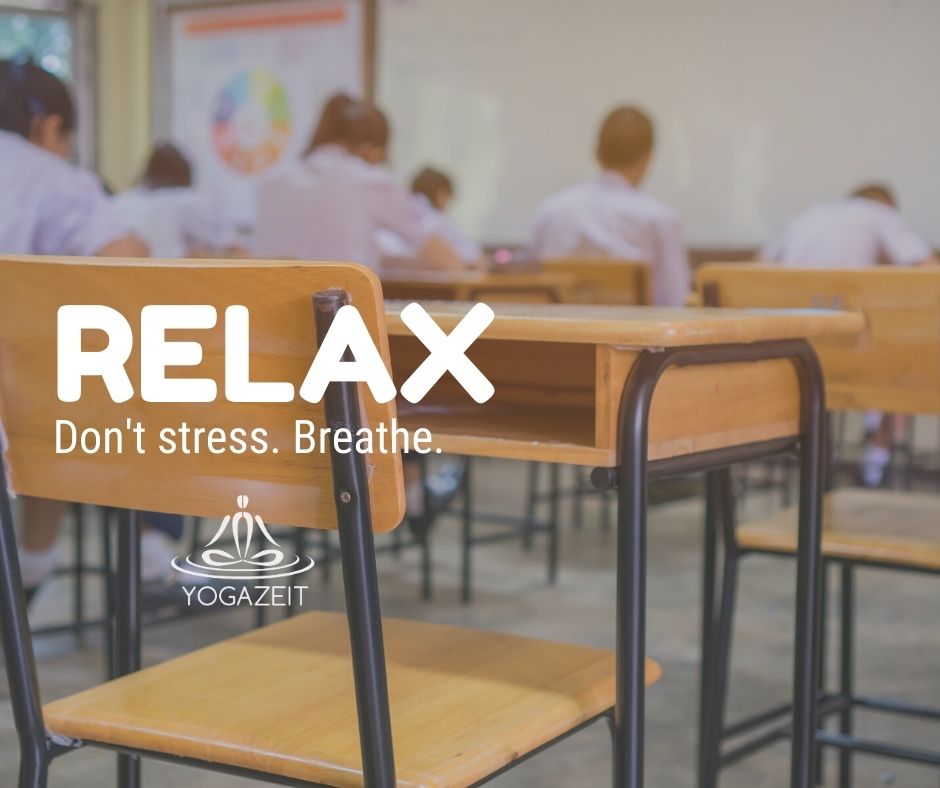
What used to be an issue for Years 9 to 11, disturbing as that is, is now hitting kids in School Years 4 to 6, according to one principal.
This echoes findings from University of Queensland child anxiety researcher Dr Vanessa Cobham, who says one in 10 children aged six to 11 now meet the criteria for diagnosable anxiety.
Children’s fears are varied and include being scared of dogs, getting stuck in an elevator, failing an exam, being run over by cars, and that their friends will die. It doesn’t matter that the likelihood of these awful things happening is slim. Too many children see them as probable. And the COVID-19 crisis probably didn’t help.
Paediatrician of almost 20 years Elizabeth Green says anxiety has never been so widespread and meltdowns in kids so common.
Kids as young as four are suffering generalised anxiety disorder, leaving them feeling intensely worried and fearful most of the time. While some degree of anxiety is normal, overblown angst is on the rise. And if it’s not dealt with we are looking at a wave of obsessive-compulsive adolescents, she warns.
While we also hear of some good news among all this: Teachers reporting that kids became more independent and resilient during the pandemic, responding well to gate drop offs and pick ups. …. Anxiety is real!
School-based stress management programs, such as mindfulness based yoga programs, have been shown to be effective in the United States. Research shows that Yoga and Mindfulness practices can have help kids deal with stress and anxiety.
“Rather than putting on a patch and treating Children and Adolescents for Mental Health illness when it’s there, our Yoga and Mindfulness programs teach kids essential skills from the INSIDE OUT,” says Regina Cruickshank, Founder and Executive Director of Yogazeit Ltd. “In our Yoga in Schools Programs we teach children how to breathe. We explore what happens to the brain and the nervous system when our emotional response takes over and we “flip our lid”.
We give kids tools to identify stressors and manage them in a child-appropriate and fun way. We make attention to breathing ‘normal’. The kids take these social emotional tools into the classroom, into their communication with peers, to conflict-resolution at home.
Ultimately these mindfulness and yoga skills – which we teach kids from as young as 3 – will benefit them for the rest of their lives. Who doesn’t want to support their children with tools to help regulate emotions and empower wellbeing? I wish Yoga was around where I grew up when I was in Primary School. I think I could have saved my teachers (and mother) a lot of ‘nerves’,” says Regina.
Yogazeit will visit your school weekly for your Yoga or Mindfulness Class. All classes and programs will be customised to the school and include the following
Yoga in School options:
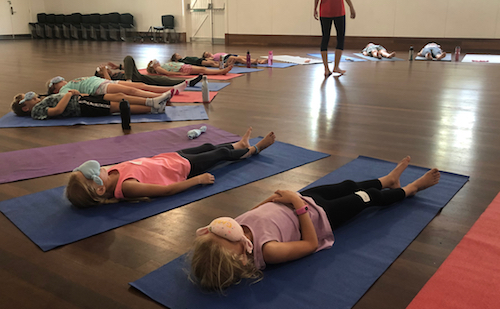
Classes are 30min (Kindy/PP) – 60min and incorporate:
Who’ll be teaching?
Our Instructors are certified Yoga Teachers with specialist training in Children’s/Teens Yoga with the Yoga Ed. Curriculum (highly skilled professionals trained to teach Yoga specifically in schools) and hold:
We have a network of over 20 teachers and will match the teacher to the school depending on needs and program goals.
What about mats?
Depending on the class size, we can provide all mats and resources – or (if your school runs multiple classes per week for more than one year level) we recommend purchasing a set of mats and storing these on sites.
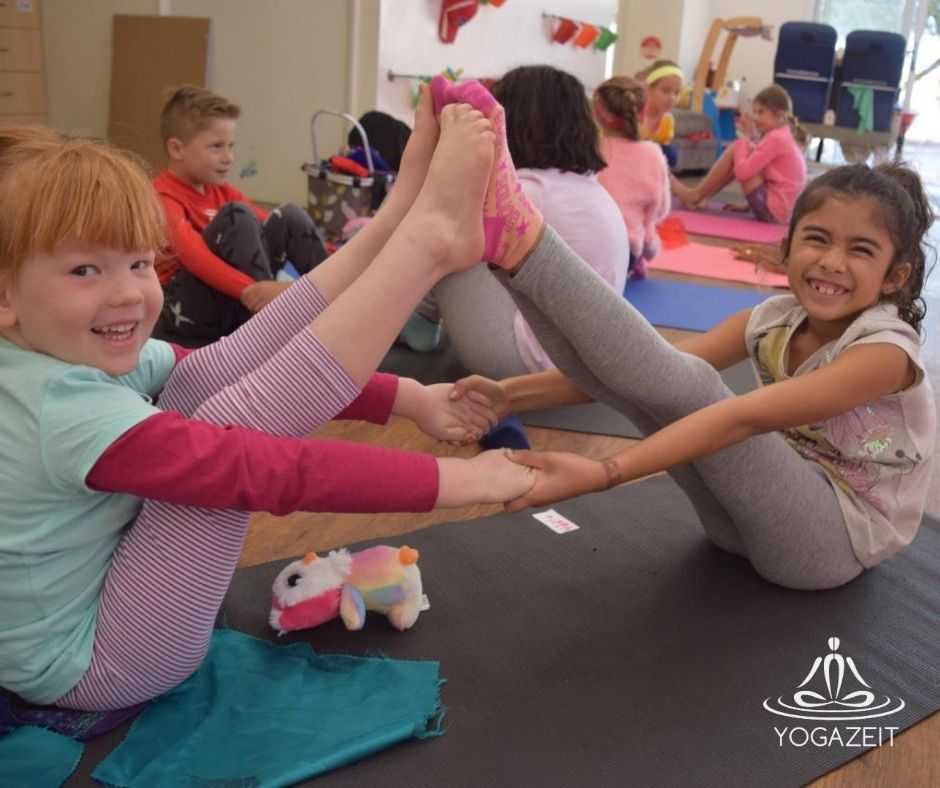
Yoga and Mindfulness in Schools also helps with
Yoga in Schools is especially beneficial for kids with special needs. All our programs are inclusive and accessible to every body and mind. Please let us know what the background of your kids/school is so that we can customise our activities and our Yoga School Program can fully support you.
This depends. Cost start at $90 per 30min regular session. It’s recommended to discuss term packages so your students (and you) can get the most out of the benefits of Yoga and Mindfulness.
For schools who’ll sign up with us for 2 continuous terms, we’re also offering FREE 1-2 hour Teacher Professional Development Workshop to support a whole school approach.
Funding Yoga in School Program / Wellbeing Program
Funding for the Yoga in Schools and/or Wellbeing Program may come out of your Wellbeing Budget, whether you’re operating under the Department of Education, CEWA or private school. Other funding sources may be the schools P&C, Parent contribution (similar to Edu Dance) or other. We’re happy to discuss some ideas and options and help you on your way of empowering Wellbeing at your school.
Low Socio Economic Intake School
If you’re school falls within the low socio economic index, we may be able to heavily reduce the Yoga in Schools Program for you or even offer it at no cost as part of our charity activities. Please inquire today and tell us a little more about your school. Email Regina.
With a network of Yoga Educators we’re able to potentially offer access to Yoga in Schools Programs across the states and also the Eastern States.
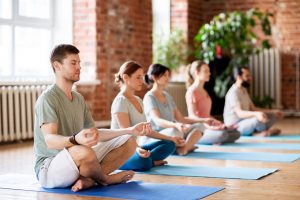
At YOGAZEIT we believe school leaders, teachers and other school professionals need to nurture themselves. Embodied wellbeing practices can provide an amazing opportunity leading to personal transformation, providing the foundation for systemic transformation. Taking time for Yoga, embracing the concept of self-care and personal mindfulness, teachers will not only improve their own wellbeing, but also support their classrooms and the larger community.
From our standpoint, there is no doubt teacher health and resilience should be made a priority in education policy.
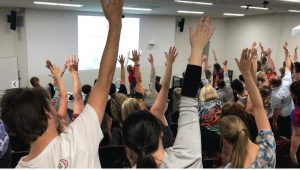
Whether you’re looking for a short “Wellbeing” PD guiding your colleagues through the benefits of Yoga and Mindfulness and giving them some hands-on-tools on improving their Wellbeing, a nurturing Yoga class or Tools for Teachers: Practical Tools on implementing chair yoga brain breaks with students in the classroom. We’ve got you covered. And the best: You don’t need to have any yoga and mindfulness experience at all!
Read more here
It is worth pointing out a few things that might be helpful to know about our Yoga Programs. Most importantly is that there will always be someone in your staff circle, parents of friends who are sceptic about yoga. Here’s a link to our Guiding Principles, ensuring that we don’t use religious connotation and our programs really are designed especially for schools to provide a safe and secure environment for breathing, mindful movement and social emotional learning.

So, here are a few things to remember when you are starting off with implementing a Yoga program at your school– things that will keep you motivated, your colleagues curious and the school administration supportive.
All our classes fulfil the requirements of the National Health and Physical Education Standards. YOGAZEIT is a proud member of Western Australia’s Health Promotion Schools Association and Act Belong Commit.
Get in touch: admin@yogazeit.com.au or call 0405 551 635 or complete our Online Enquiry Form
More info about our Yoga Programs at Schools can be found at www.yogazeit.com.au
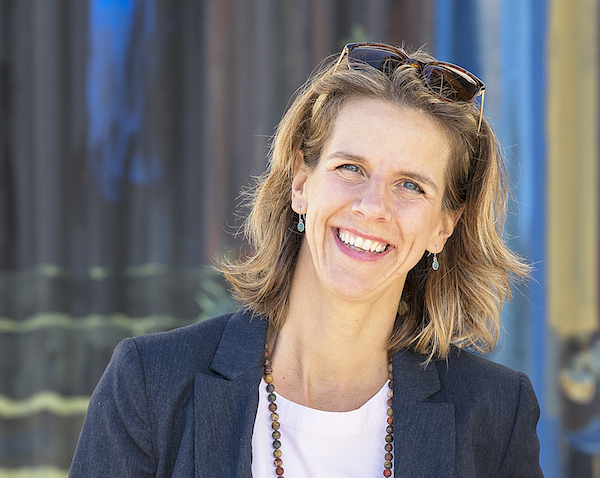
Written by Regina Cruickshank.








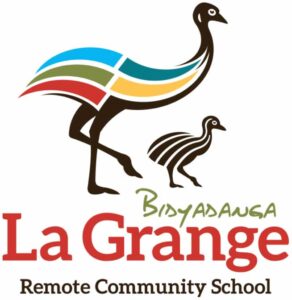

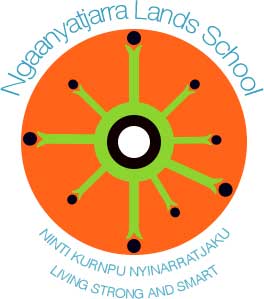
No spam – just event updates, breathing exercises and free meditation/mindfulness activities.
We won’t pass your details onto third parties. Promise!
© Yogazeit 2019–2023. All rights reserved.
View our Terms and Conditions and Policies and our Guiding Principles.
ABN: 62 631 658 305
Website designed by Eurisko with thanks and gratitude to Lotterywest Grants.
Yogazeit is taking a breathing space.
Any inquiries can be sent to admin@yogazeit.com.au.
We wish to acknowledge the traditional custodians of the land we are working and living on, the Whadjuk Noongar people.
We acknowledge and respect their continuing culture and the contribution they make to the life, education and mindfulness of this city and this region supported by the leadership of Noongar elders past, present and emerging.
We extend this acknowledgement and respect to all Aboriginal and Torres Strait Islander peoples across Australia.